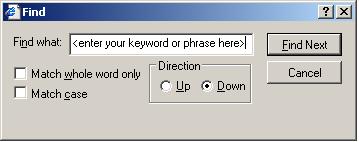|
|
|
You are here:Home → Search Engine Help |
Search Engine Help
|

|
The Federal Transit Administration (FTA) website search engine is powered by Google. There are two types of searches that can be run: Basic and Advanced. For the Google Help Page, visit http://search.google.dot.gov/basics.html
Basics of Google Search
How It Works
To perform a search, type in a few descriptive words and click Search for a list of relevant webpages. Google works by returning only webpages that contain all the words you specified. If you perform a search and get no results, try to remove some words from your search to broaden it. If you get too many results, try to add some words to your search to narrow it.
For example, if you search for New Starts FFGA Virginia, you will receive fewer, yet more specific results, than if you search only for New Starts. Note that the search is not case sensitive, meaning that a search for new starts returns the same results as a search for New Starts.
Automatic Exclusion of Common Words
Google ignores common words and characters such as how and to, as well as certain single digits and single letters. These common words and characters tend to slow down your search without improving the results. Google will indicate if a common word has been excluded by displaying details on the results page. If a common word is essential to getting the results you want, you can include it by putting a plus sign (+) in front of it (be sure to include a space before the "+" sign). For example, a search for New Starts how to guide will automatically exclude the common words how and to, changing the search to New Starts Guide. A search for New Starts +how +to guide will include all the words.
Searching for Words versus Exact Phrases
By default, Google searches for all of your words in no particular order. If the order of the words is important to finding the results you're looking for (for example, a specific title of a Federal Register), putting quotes around the phrase will force Google to search for the exact phrase. For example, searching for Proposed Title VI Circular will produce more general results than searching for "Proposed Title VI Circular" will.
Caution should be used when searching for exact phrases; if the title or phrase doesn't match a result on the website, it will be more difficult to find the appropriate results.
Word Variations (Stemming, Wildcards)
To provide the most accurate results, Google does not use "stemming" or support "wildcard" searches. In other words, Google searches for exactly the words that you enter in the search box. For example, searching for Start or Start* will not find results with the word Starts in it; it will only find results with the word Start. When in doubt about the format of the word, try more than one search, one for Start and one for Starts.
Advanced Google Search Options
The same general principles of the Basic Google search tool also apply to the Advanced Google search. However, the Advanced Google search has more options to narrow your search.
Searching for Words versus Exact Phrases
The advanced search has four options you can choose from to specify how you want Google to use the keywords you enter to find results. To use this option, enter your keywords in the appropriate text field; choose from: all of the words, the exact phrase, any of the words, or without (or none) of the words. You can also change the number of results returned for each page or can go to the Department of Transportation (DOT) search engine to search all of DOT.
Languages
Google has the option to search for pages in different languages. Note that the vast majority of pages on FTA's site are in English. If you don't select an option, Google will search for any language.
Occurrences
This option allows you to specify where your keywords should appear in the webpage. The options are: anywhere, in the title, or in the URL (or web address). If you don't select an option, Google will search for the words anywhere in the page.
FTA-Specific Search
This is the most popular advanced search feature; it allows you to specify a specific section of the FTA website to search. When using this feature, Google will return results only from the specified section of FTA to further narrow your search. The options available are those that appear in the global site navigation (located on the left-hand side of the page).
Linking
You can search for all pages that link to a particular webpage by copying the URL (or web address) of the page (for example, http://www.fta.dot.gov/) and pasting it into this field and clicking the Search button. Note, do not click the Departmental Search button unless you want to find all DOT pages that link to this page.
Other Search Techniques
Searching within a Document
If you are searching for a specific word or phrase on a page and the page itself is lengthy, try using CTRL+F or Edit: Find in your browser toolbar to locate all occurances of that word/phrase on the page. Once you are in your browsers Find function, type the word or phrase into the Find what: text box. You have the option to match the whole word only and/or match case. When you begin your search via this method, it is best to have your cursor at the top of the page so that it searches the entire page.

|
|
|